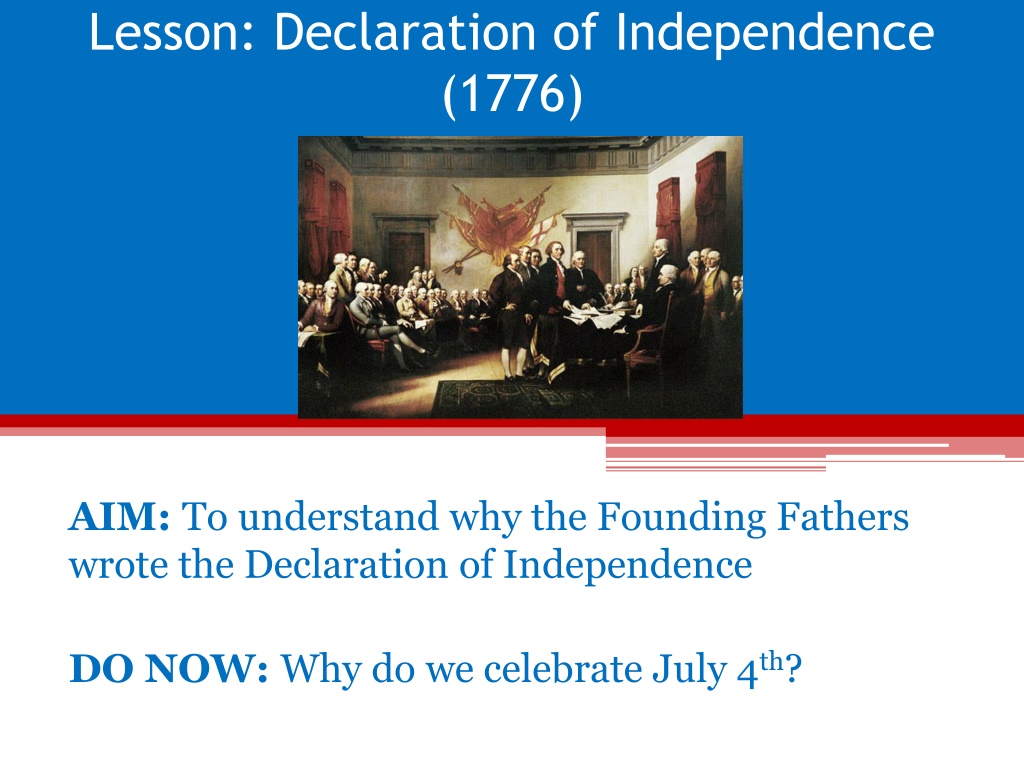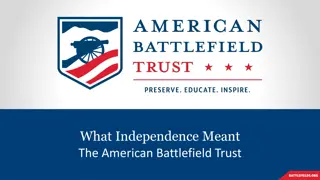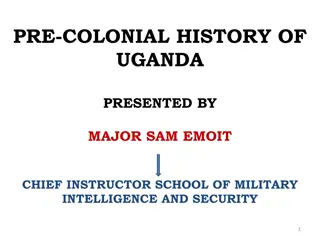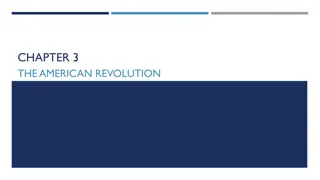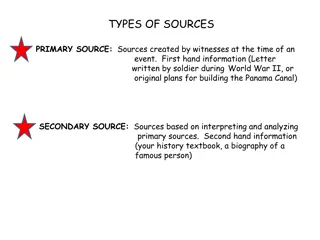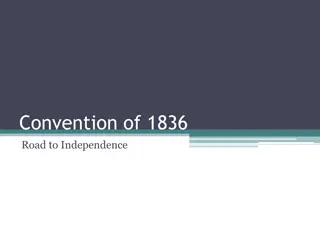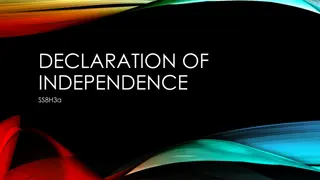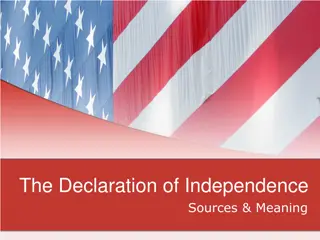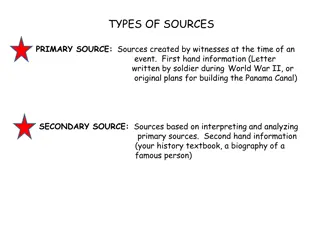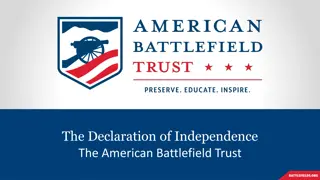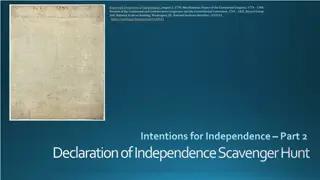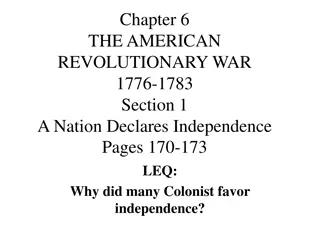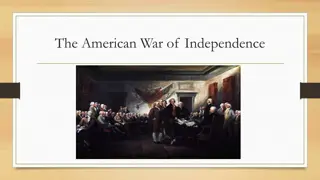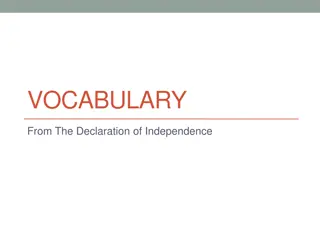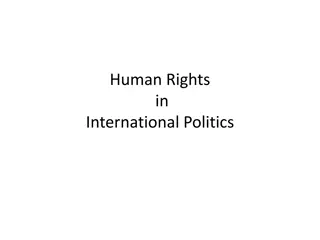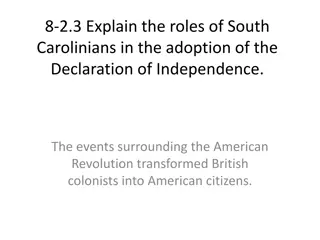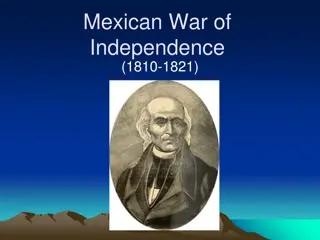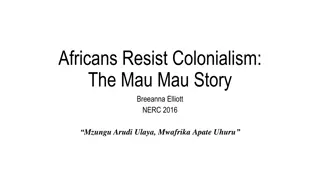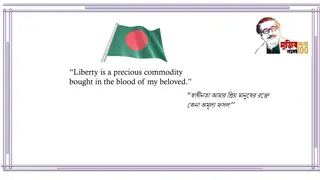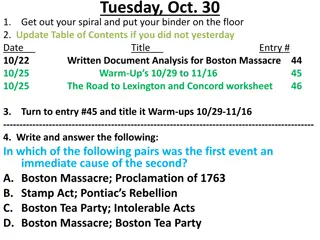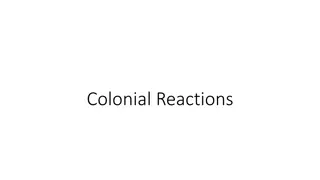Understanding the Declaration of Independence and Colonial Perspectives
Explore the significance of the Declaration of Independence written by Thomas Jefferson and the differing perspectives of historians on the motivation behind the American Revolution. Learn about the ideological origins and beliefs of the colonists, their fears of tyranny under British rule, and the desire for liberty and freedom. Delve into the debates between Patriots and Loyalists in the quest for independence from England.
Download Presentation

Please find below an Image/Link to download the presentation.
The content on the website is provided AS IS for your information and personal use only. It may not be sold, licensed, or shared on other websites without obtaining consent from the author. Download presentation by click this link. If you encounter any issues during the download, it is possible that the publisher has removed the file from their server.
E N D
Presentation Transcript
Lesson: Declaration of Independence (1776) AIM: To understand why the Founding Fathers wrote the Declaration of Independence DO NOW: Why do we celebrate July 4th?
Label the images below: Patriot or Loyalist and define the term in your own words Patriot - a person who strongly supports their country and is prepared to defend it against enemies or detractors Loyalist - a person who remains loyal to the established ruler or government, especially in the face of a revolt
Label the images below: Patriot or Loyalist and define the term in your own words Patriot - a person who strongly supports their country and is prepared to defend it against enemies or detractors Loyalist - a person who remains loyal to the established ruler or government, especially in the face of a revolt
Background The Declaration of Independence was written by Thomas Jefferson and signed by representatives from all 13 colonies on August 2, 1776. In the document, the leaders outlined their reasons for declaring independence from England. Historians have disagreed as to whether the colonial leaders were motivated by selfish or ideological reasons.
Historians: Directions Read the excerpts from the two historians on the sheet provided. Then complete the chart provide using the claims proposed by the historians in the response. Use evidence from the documents to support your claims. Be prepared to discuss.
Historian #1: Modified Excerpts from The Ideological Origins of the American Revolution by Bernard Bailyn (1967) The Declaration of Independence represents the colonists deepest fears and beliefs. The colonists believed they saw a clear pattern in the events that followed 1763. They believed they saw an evil and deliberate conspiracy to crush liberty in America. They saw evidence of this conspiracy in the Stamp Act and in the Coercive Acts. They also believed that America was destined to play a special role in history. They believed that America would become the foundation of a great and mighty empire, the largest the world ever saw to be founded on such principles of liberty and freedom, both civil and religious. The colonists believed that England was trying to enslave them, and that they should use all the power which God has given them to protect themselves.
Historian #2: Modified Excerpts from A Peoples History of the United States by Howard Zinn (1980) It seemed clear to the educated, upper-class colonists that something needed to be done to persuade the lower class to join the revolutionary cause, to direct their anger against England. The solution was to find language inspiring to all classes, specific enough in its listing of grievances to fill people with anger against the British, vague enough to avoid class conflict, and stirring enough to build patriotic feelings. Everything the Declaration of Independence was about popular control over governments, the right of rebellion and revolution, fury at political tyranny, economic burdens, and military attacks was well suited to unite large numbers of colonists and persuade even those who had grievances against one another to turn against England. Some Americans were clearly omitted from those united by the Declaration of Independence: Indians, black slaves, and women.
Historian 1 Claim Evidence Historian 2 Claim Evidence
Historian 1 Claim 1. The colonists created the Declaration of Independence out of fear from the British s intentions Evidence 1. The Declaration of Independence represents the colonists deepest fears and beliefs. The colonists believed they saw an evil and deliberate conspiracy to crush liberty in America. 2. The colonists believed that America would become the foundation of a great and mighty empire, the largest the world ever saw to be founded on such principles of liberty and freedom, both civil and religious. The colonists believed that England was trying to enslave them, and that they should use all the power which God has given them to protect themselves. 2. America was meant to be its own nation
Historian 2 Claim 1. The upper class colonists wanted to start a revolution against the British Evidence 1. It seemed clear to the educated, upper- class colonists that something needed to be done to persuade the lower class to join the revolutionary cause, to direct their anger against England. The solution was to find language inspiring to all classes, specific enough in its listing of grievances to fill people with anger against the British, vague enough to avoid class conflict, and stirring enough to build patriotic feelings. 2. The Declaration of Independence united the colonists against the British 2. Everything the Declaration of Independence was about was well suited to unite large numbers of colonists and persuade even those who had grievances against one another to turn against England.
ODT What is the conclusion that can be drawn from analyzing the perspectives of two noted historians? Response:
American Declaration of Independence Directions: On the sheet provided, read the paragraphs from the Declaration of Independence and CHUNK them and place your response to the right of the statements. Be prepared to share.
American Declaration of Independence When in the Course of human events it becomes necessary for one people to dissolve the political bands which have connected them with another and to assume among the powers of the earth, the separate and equal station to which the Laws of Nature and of Nature's God entitle them, a decent respect to the opinions of mankind requires that they should declare the causes which impel them to the separation. We hold these truths to be self-evident, that all men are created equal, that they are endowed by their Creator with certain unalienable rights, that among these are life, liberty and the pursuit of happiness. That to secure these rights, governments are instituted among men, deriving their just powers from the consent of the governed. That whenever any form of government becomes destructive of these ends, it is the right of the people to alter or to abolish it, and to institute new government, laying its foundation on such principles and organizing its powers in such form, as to them shall seem most likely to effect their safety and happiness.
American Declaration of Independence When it becomes time for a group to end their political relationship with another group, they should do so by declaring why they should be separated. All men are created equal and thus are entitled to certain rights such as life, liberty, and the pursuit of happiness. It is the government s duty to protect these rights, and the citizens have the right to change or replace the government if it is not fulfilling its duty.
Declaration of Independence A List of Grievances Directions On the sheet provided are most of the grievances from the Declaration of Independence. Read the examples and indicate on the line provided: If the grievance seems to be something that would affect only the rich and powerful, write O (for ONLY rich and powerful) If the grievance seems to be something that would affect all the colonists, write A (for ALL the colonists)
Declaration of Independence Grievances (1 & 2) He has refused to pass, and forbidden his governors to pass, important and necessary laws. _______ (5 & 6) He has broken up certain legislatures that opposed him, and refused to let others be elected. _______ (8 & 9) He has refused to establish courts of justice, and has made judges dependent on him for their jobs and salaries. _______ (10) He has sent swarms of British officers to harass our people and eat our food. _______ (11 & 12) He has kept among us, in times of peace, standing armies, without the consent of our legislatures. _______
Declaration of Independence Grievances How do these grievances seem to be things that upset rich people or everyone? How do you think these complaints would give people reason to go to war and possibly die? Why or why not?
Exit Slip: Directions Read the statements from the Declaration of Independence on the sheet provided. Using the space provided write your own interpretation of these three sections. I will be collecting this.
Exit Slip: Declaration of Independence (1) We hold these truths to be self-evident, that all men are created equal, that they are endowed by their Creator with certain unalienable rights, that among these are life, liberty and the pursuit of happiness. (2) That to secure these rights, governments are instituted among men, deriving their just powers from the consent of the governed. (3) That whenever any form of government becomes destructive to these ends, it is the right of the people to alter or to abolish it, and to institute new government.
